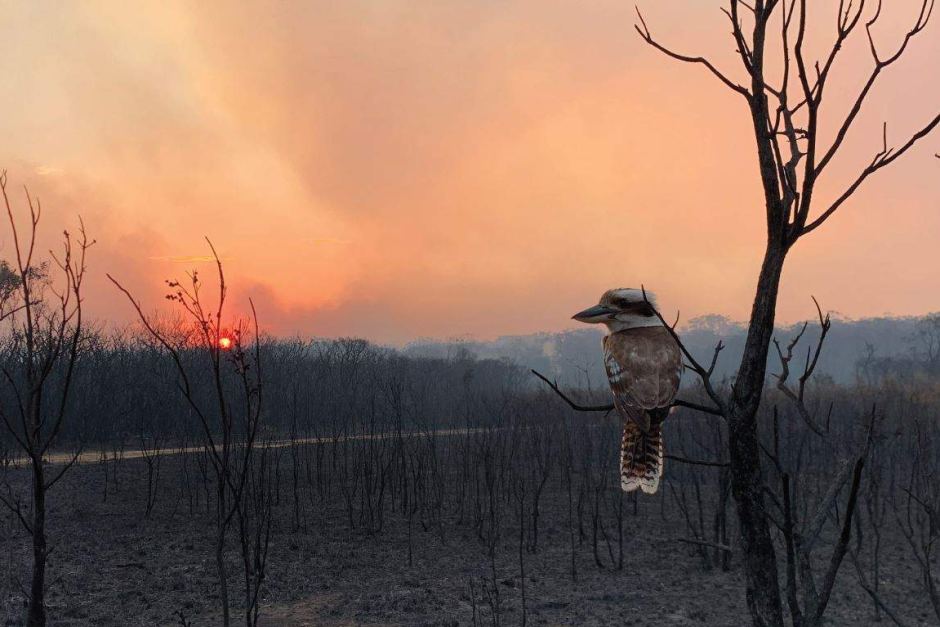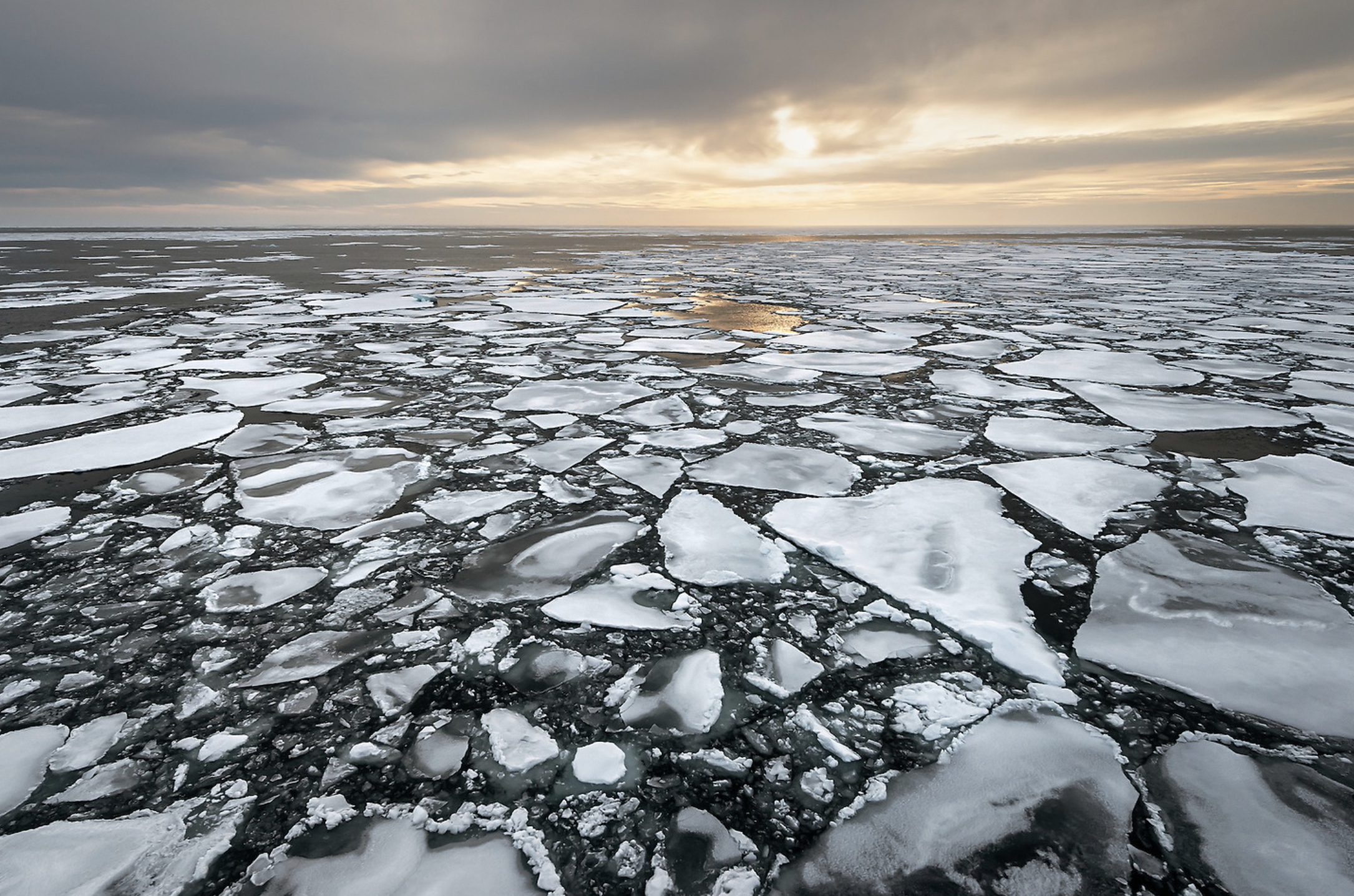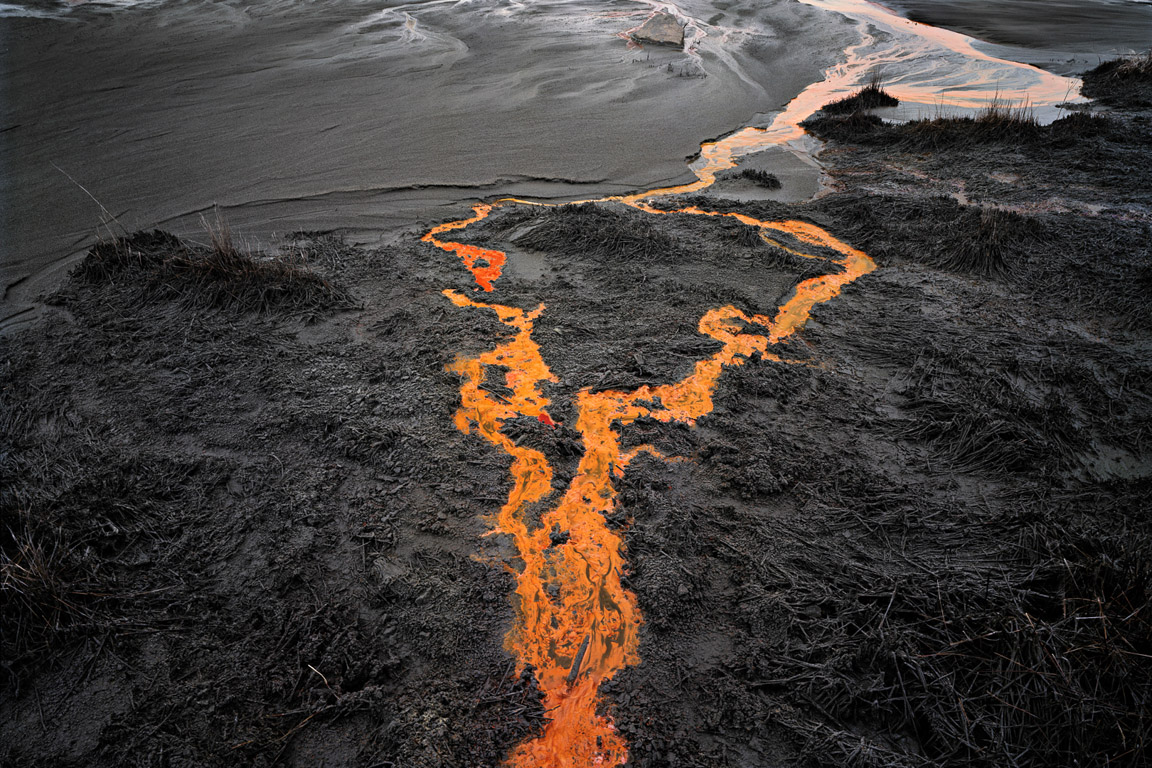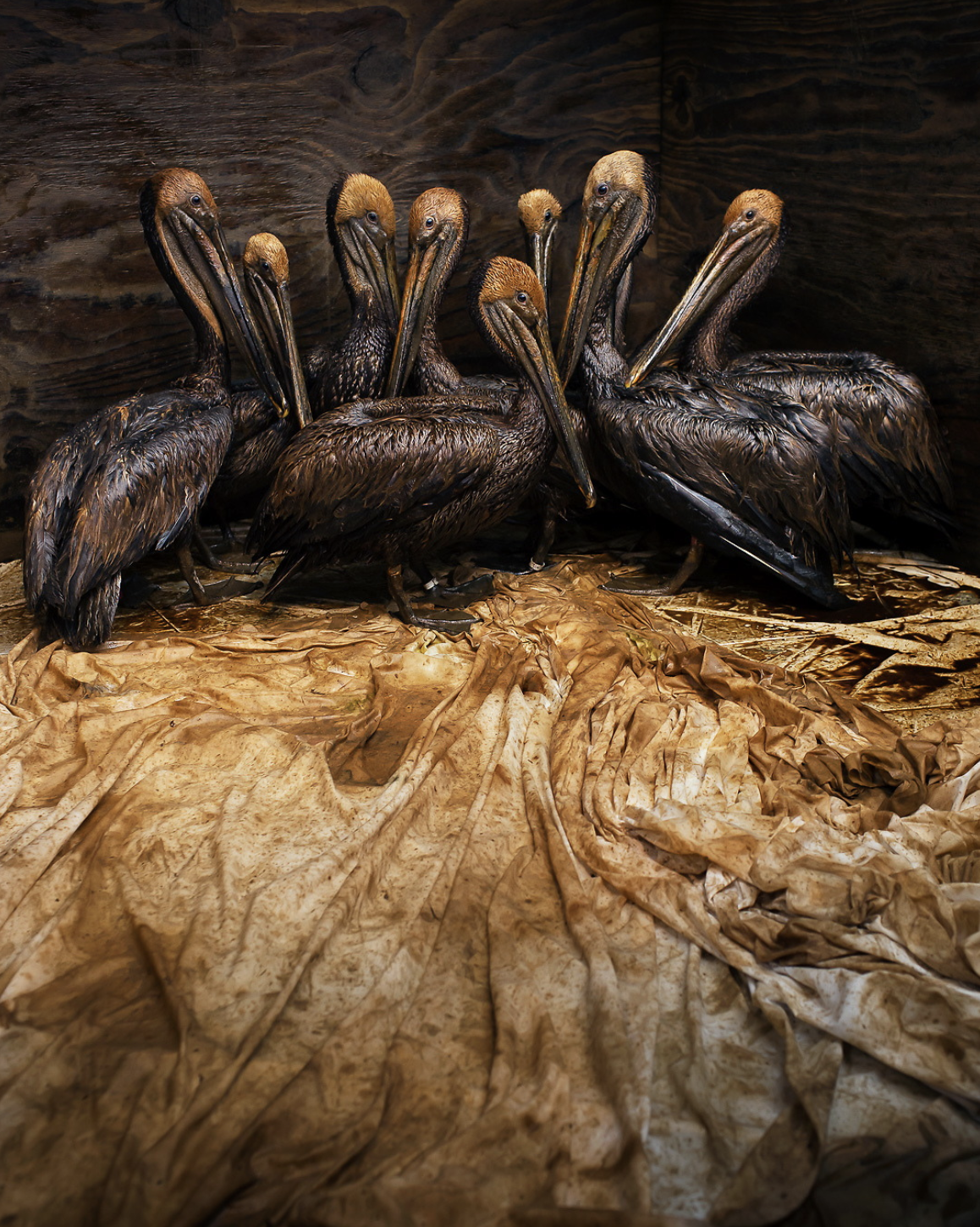
Daniel Beltrá, Oil Spill 2010
Vogue Australia, January 2020 (PDF)
As we enter a new year and a new decade, the tendency to look inwards and improve ourselves with resolutions has been replaced with a desire to help future-proof the world instead. Noelle Faulkner grapples with a case of eco-anxiety and the realities of reducing her carbon footprint.
Two words flash up on my screen as I refresh the news: ‘Not today.’ As Queensland and New South Wales burned-up in flames in November, the words were uttered by New South Wales Premier Gladys Berejiklian alongside our Prime Minister Scott Morrison when they were asked about climate change: “Not today.” “Now is not the time.” “We’re not here to talk about that.”
We’ve heard this rhetoric from leaders before, phrases that are filling Australia’s youth with despair. As I write this, the thick, hot air outside my home is an eerie, walnut glow from the 300-plus fires that burn across Australia. But my view is not nearly as extraordinary compared to the fluorescent orange Blade Runner 2049-like blanket that envelops northern New South Wales. I read a meteorologist’s explanation of what happens when a firestorm creates a weather pattern of its own: ‘dry lightning’, ‘firenados’ and ‘black hail’. There are floods in England, wildfires in California, a typhoon clean-up underway in Japan and Venice, Italy is underwater. 11,000 scientists have signed a paper calling for urgent climate action while the UN reports that climate-crisis disasters are occurring once a week. I think of the opening scene in the 1995 post-apocalyptic flick 12 Monkeys, where doomsday headlines and news scenes are flashed in a montage, events that end up forcing humans underground. I feel overwhelmed. My heart beats faster. I cry. If there ever was a preview to what an apocalypse looks like, I think, we’re living it.

Matthew Abbott, New York TImes
The above wasn’t supposed to be the lede of this story. But it sums up what an increasing number of people around the world are also feeling: eco-anxiety. Psychologists describe it as a recent disorder that affects those worried about the environmental crisis. How I would describe it? Like the weight of the world is on your shoulders. We’ve seen glimmers of it in the Extinction Rebellion protests, in Greta Thunberg’s impassioned speeches, in desperate pleas from scientists and conservationists and we’ve seen it used like a ping-pong ball in parliament. A mix of rage, grief, helplessness, sadness and existential crisis, it’s been talked about as the price we pay in a digital world, with information all around us. “Anxiety is contagious,” explains Ros Knight, clinical psychologist and president of the Australian Psychological Society. “When we feel anxious about something and start talking about it, it starts building up. Then, society itself becomes anxious. It provokes people to think: ‘Well, what do I do? How much can I do?’” There’s pure intention to start, but throw in social media, dramatised news reports, shock jocks, comments from politicians, misinformation and keyboard warrior trolls and you have the ingredients for a hot, eco-anxious mess.
 Adam Stevenson, Wallabi Point, NSW
Adam Stevenson, Wallabi Point, NSWIf you observe 2019 in terms of a Zeitgeist arc, we started the year looking inwards. Conversations around mental health led to self-care as a trend, memes and self-deprecating cultural gags (for example: ‘Dad culture is going to an art gallery and saying: “I could do that!”). FOMO (fear of missing out) was pushed to the side for JOMO (joy of missing out) and things normally on the introvert spectrum, like gaming, book clubs and non-alcoholic aperitifs, moved into culture’s cool axis. Then suddenly, something flipped and our emotional cups runnethed over. Perhaps it was political discourse, hard-to-ignore research on global warming or inter-generational conflict, but we started seeking answers outside the self. As science fuelled grief and anger, curiously, new-age pseudoscience gained traction.
Enter big woo-woo energy, a resurgence of new-age spirituality first adopted by Gen Z and then by the mainstream. According to findings by LS:N Global, an insights platform that documents consumer trends and behaviour, these new-age rituals provide “a sense of purpose for young people looking to gain a foothold in society”. Research found teenagers with some kind of spiritual connection were 60 per cent less likely to suffer depression. Tarot cards, crystals and astrology acted as a therapeutical antidote to anxiety, while also being the antithesis of organised religion.
By March – the first Mercury retrograde of the year – seasons were being referred to by their astrological archetype. Memes like: ‘Watch your back, it’s Gemini season’, appeared on social media and our solar system’s smallest and speediest planet copped even more blame for bad days every four months. If it felt like everyone was relying on personalised, algorithmically generated horoscope apps, like Co-Star and The Pattern, to get through their day, that’s because they were. By August, Co-Star had more than three million users. These apps became so popular because their daily affirmations made users feel seen, heard and understood – even if they were just automated notifications created using NASA data, artificial intelligence and astrology. Big brands soon jumped on board. Spotify, for example, partnered with astrologer Chani Nicholas to create 12 playlists inspired by the zodiac. Big woo-woo energy even spilt into the 2020 US presidential campaign when motivational speaker and Oprah’s spiritual guru, Marianne Williamson, entered the race. She had a velvet mid-Atlantic accent and the calm idiolect of a Byron Bay aunt as if she was a sunflower shoved down the barrel of a gun. The final nail in the spiritually woke coffin was the ying to pop culture’s yang: Kanye West. In six months, the musician went from dazzling, explosive and cutting-edge artist to cringe-y, soapbox-rapping, Republican televangelist.
Unfortunately, one can only stare through rose quartz crystals for so long. While Australians lost their homes and livelihood, and animals their habitats, a wake-up call echoed across our great southern land, sparking a debate around environmental inaction. At the end of 2019 the Brown to Green Report, which charts the G20’s race towards a net-zero emissions economy, was released. It condemned the approval of the Carmichael/Adani coal mine and our lack of a long-term greenhouse-gas reduction strategy. It pointed out that fossil fuels make up around 92 per cent of Australia’s energy mix and that we are the second-most carbon-intensive nation in the G20. Also, despite being one of the best candidates for solar and wind, our renewable energy uptake is deplorable. Australia is not on track towards limiting global warming to 1.5 degrees Celsius by 2030. Not even close, it read.

Daniel Beltrá, Aerial view of depleted sea ice in the Arctic Ocean
A psychologist suggested to me that to gain feelings of grounding, I should look at what I can change – you can’t control the weather, but you can control how you move in it, or something. For some, this might be looking at how far that online order needs to travel and who made it, which brands you buy, whether your food is locally grown or imported, choosing bee-friendly plants for your garden or reducing water usage in your home and workplace. Me? I went straight for the jugular: my carbon footprint. Because, beyond what I write for Vogue, I also write about two things I hold in great ardour: cars and travel. This means driving and flying, flying places to just to go driving, and driving just because I love it. I’m a hypocrite. And yes, I do know that even if I am driving electric vehicles, tyre and brake dust are major air pollutants. I find solace in the fact that the travel and automotive industries are committed to sustainability – be it in alternate fuels, electrification, mobility options, earth- friendly materials, or zero-carbon commitments – such as Formula 1’s net-zero footprint commitment by 2030 and Qantas’s pledge to do the same by 2050. For this reason, I obsess over future mobility innovations, always looking for a Hail Mary. But being so close to such technology also highlights the advances we are missing out on in Australia due to lack of infrastructure and future-proofing. And so, the cycle of anger and guilt repeats.
It was a carbon-tracker app that made my stomach flip first. In just four months, my carbon dioxide emissions from test-driving cars in the name of journalism and flying overseas were more than the yearly energy output of 12.3 homes, 21.7 passenger cars and 13,045,785 charged smartphones. Air travel was the biggest culprit of all. I calculated that I would have to plant 1,692 seedlings (1,694 to account for the ficus and peace lily that died while I was away in that period. RIP) to offset my footprint – and they’d first have to grow for 10 years. I felt ill. I hadn’t included food, water, electricity, public transport or hotel stays. I became obsessed with cutting carbon corners and reducing my footprint. I began riding Lime bikes everywhere I could. I started to feel uneasy about attending certain events, writing about particular car manufacturers, hotel groups or airlines. I calculated my offset each time I drove something outrageous, which really didn’t help. A Lamborghini that I loved also left me so guilt-ridden; I filled it with plants from Bunnings and felt anxious writing about it. Grappling with the contrasting realities of career versus personal responsibility is difficult and exhausting, but Knight reminded me we can only work within the parameters of what we’re given. “Thinking about anything else will just leave you overwhelmed,” she offered.

Edward Burtynsky, Nickel Tailings
Asymmetrical feelings about the future I had seen for myself followed, along with the stark realisation that many of the things I want or love doing are problematic. This is a difficult pill for all of us to swallow, especially when certain things have emotional currency, nostalgic legacy or pay the bills.
Travelling the world does do more harm than good. Always needing the latest gadget creates unnecessary e-waste. What if you want more than three kids? Prefer eating meat? Can only afford fast fashion? Use products containing palm oil or brands that test on animals? It only took a year before we started side-eying plastic straw-drinkers, and we’re all too familiar with the shame of muttering: “Sorry yes, I need a plastic bag” at the checkout. Remember when cigarettes were glamorous? Or when fur was chic? Take vintage cars, beautiful and often romantic talismans of the past – they’re sentimental and make people of all ages smile, but ultimately, they’re a pollutant. Is driving an old car about to be the new smoking?
Knight says that this climate change-led fear and anxiety can be helpful as it encourages discussion and democratic conversation. “Not talking about it is likely to make people more anxious, because it disempowers them,” she says. “It makes them feel like there’s nothing they can do. If we feel like we’re making an impact, even if it’s just doing something small, that lowers our distress levels.” While other professionals, like Caroline Hickman, a UK-based psychotherapist who specialises in climate anxiety, suggests we start thinking of it as eco-empathy. “Empathy goes a long way
because it has a layer of understanding,” she said as a guest on the Climate Crisis Conversations podcast. “It’s much more about love, warmth, community and contact than it is about anxiety, which we can pathologise,” she says. “But eco-empathy is something everyone would want to sign up to.”

Daniel Beltrá, Brown pelicans (Pelecanus occidentalis) covered in crude oil from BP's Deepwater Horizon wellhead spill wait to be cleaned at the International Bird Rescue Research Center in Fort Jackson, Louisiana, June, 2010
Because here’s the thing – we need to consider the generations born in this millennium. What world will they see themselves in? I might have to give up my dream of ever owning a 1969 Corvette Stingray, the car I’ve been dreaming of since childhood, but they might have to forego out-of-season fruit, seafood or cotton. “We’ve been looking at the technologies and apps which are designed to de-stress, control, re-boot,” says Martin Raymond, co-founder of The Future Laboratory and editor-in-chief of LS:N Global. “This has been about resilience ... We’ve had 10 years of nannying and comforting and universities removing contentious things from their curriculum. But now, there’s a push back against that. Young people are seeing anxiety isn’t just a legitimate response, but something that comes from actually not understanding the mechanisms needed to survive in a changing world.” He adds: “They’re saying: ‘Actually, we’re panicking because we’ve lost the accoutrements of engagement and how to be robust and resilient and fight back.’” This is why the snowflake trope is dead and there is hope: an entire generation is now fighting for its future and as Thunberg so reminded us, they are watching us all.
“The ship is gone and we’re now stuck with the lifeboat,” says Raymond, noting that the silver lining is there, albeit a threadbare one. “And that’s the reality. The doubters now will feel the crunch and no longer be respected because, while you’re entitled to your opinion, you’re not entitled to the facts.” And climate change is a fact. “Every scientist of intelligence and note has signed a declaration that the planet is dying. We know that. What the fuck are we doing about it?” he says. “The people introducing the laws against climate change are sitting on the wrong side of history. They will be remembered in a way that we remember people who burned books or damaged ruins and tried to prevent progress.”

Matthew Abbott for The New York Times
As such we start to look for answers and guidance, be it in science, on our phones, at the stars or in our actions, as a way to calm our nerves, understand our feelings or simply feel heard. This year will force us to look in the mirror and stare ourselves down, however harsh and uncomfortable our reflection in 2020 might appear. All this anxiety and fear had led us to be so worried about the future of the world, we have been ignoring our relationship with it. Feeling the weight of the world is also just proof you’re living in it.
This article was originally published in print form in the January edition of Vogue Australia.


